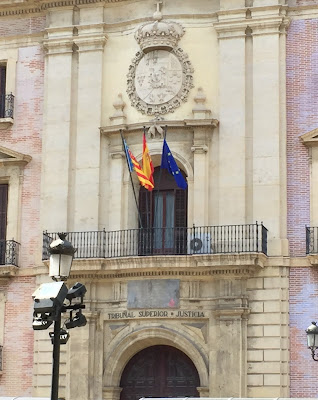There’s nothing particularly wrong with the human race. It’s just people that are sometimes a bit weird.
That was confirmed by a visit to the fine old Catalan town of Reus. It’s rather an attractive place, as it happens, with a pretty centre. But it also has a curious history, as we learned from an old friend, Rosa, someone I’d mistakenly let drift out of contact for many years until last year, when we had a great reunion during which Danielle at last met her.
Rosa lives in Reus, which is why we made a stop there, on our way to Perpignan in southwest France. I’ll explain in a later post why we were heading for Perpignan. Probably.
 |
| Danielle and Rosa are leading the way into the great restaurant and Vermut maker Vermuts Rofes |
But, she explained, Reus rested too much on its laurels. For instance, local businesses, including shops, liked to shut at 1:00 in the afternoon and open again at 5:00. Not convenient for the people who travelled into town to buy supplies and equipment, or perhaps to see a doctor,, and might have liked to make a day of it, with lunch thrown in. Apparently, the good merchants of Reus didn’t care. Clients simply had to adapt their expectations to the way Reus businesses liked to operate.
As a further example of their outlook, Rosa also pointed out to us one of the most fashionable shops in the town. Perhaps the most fashionable. Rosa went there once, just once, and never again. She was dressed casually, though well. That didn’t stop the shop assistant she turned to for help finding an item she wanted, telling her she doubted the shop had anything to offer her.
This strikes me as the kind of arrogance that underlies the story told about many high-end shops where, if you ask the price of something, the assistant will answer, “if you need to ask, you can’t afford it”.
Faced with either of those types of snootiness, my inclination would be to do what Rosa did, and walk out of the shop, never to return.
Now whether this kind of attitude was the only cause of the relative decline of Reus or whether other factors came into play, what happened is that as the decades rolled by and turned into centuries, Reus faded while Tarragona blossomed. Eventually, the upstart on the coast overtook its rival, adding wealth and dynamism to the privilege it had enjoyed since Roman times, of being the capital of the province that includes both, and which has always carried its name.
You can imagine how Reus felt. Even the university has its faculties split between the two centres, and rather than be called after either, has given itself the name of a person instead (Rovira i Virgili, if you must know, who was president of the Catalan government in exile from 1940 to 1949, in succession to Luis Companys who went into exile in France after the end of the Spanish Civil War but was handed back by the Nazis, to meet an unpleasant and quick end, though not quick enough, given how unpleasant it was).
We enjoyed one particular facet of the rivalry between Reus and Tarragona. This is associated with the name of General Juan Prim. If you’ve never heard of him, let me assure you that nor had we until we got there.
He was a nineteenth-century general, born in Reus, who made a name for himself in, among other things, civil wars devastating Spain in his youth and later in colonial warfare in North Africa. A couple of generations later, another Spanish general, Francisco Franco, would win prominence by his North African campaigns. The difference, however, was that Prim remained surprisingly liberal, not something anyone could say about Franco, who was just prim. And nasty.
Prim in particular spent ages scouring Europe for someone who could be brought into Spain as constitutional monarch, replacing both the warring branches of the existing royal family (literally warring). That would mean accepting a crown offered by democratic election. Prim is reported to have said that looking for a democratic monarch in Europe was like looking for an atheist in heaven.
Eventually though, Amadeo of Savoy accepted the role. In fact, he only lasted, as King Amadeo the first (and only) of Spain, for just over two years. After an attempt in 1873 on his and his wife’s lives, he decided that, quite frankly, it was too much like hard work trying to rule Spain, a nation as deeply divided then as it is now. He stood down and told the Cortes, the Spanish parliament, that Spain was simply ungovernable.
Prim, though, didn’t see any of that. In December 1870, as he left the Cortes, of which he was a member, just a few weeks after voting for Amadeo to be given the throne, he was gunned down in the street and died soon after.
 |
| Prim and his horse Seen from the direction of Tarragona |
Reus decided to give its glorious son a suitable monument. It takes the form of an equestrian statue of Prim in the saddle, brandishing his sword.
Now there’s a story told in Reus, that the statue is so oriented that the horse’s back end and, I suppose, therefore Prim’s too, are facing Tarragona. I’ve not been able to confirm that but, hey, it’s telling that the tale is even told, isn’t it? Whether it’s true or not.
It’s great to celebrate your favourite son. But if you can do it in a way that also abuses your despised neighbour, isn’t that just win-win?
See what I mean? The human race may be absolutely fine. But think of Prim. Of what happened to Companys. Of the behaviour of Reus shopkeepers. Or of the rivalry of that city with Tarragona.
Surely you’ve got to agree that people are weird.





















